Editor’s Note: CNN’s series often carry sponsorship originating from the countries and regions we profile. However, CNN retains full editorial control over all of its reports. Our sponsorship policy.
The history of food in Mumbai is closely linked to the growth of this city from fishing village to megapolis. As wave after wave of immigrants from all over the country came with dreams of gold in their eyes, they brought their culinary treasures with them. The result? A smorgasbord of cooking styles and street food that reflects our cosmopolitanism as much as our carbohydrate-fueled work ethic. Here’s a sampling of 40 must-try foods that define Mumbai’s food culture, with Muslim, Gujarati, Goan, Coastal, South Indian, Parsi and of course local Maharashtrian influences.
1. Akuri on toast
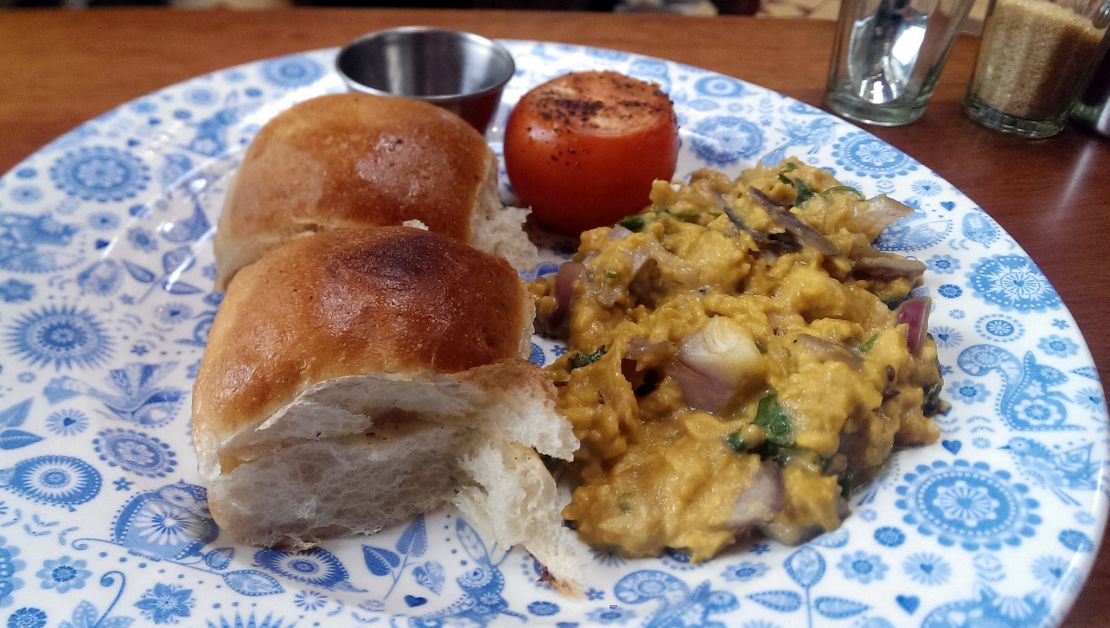
Move over scrambled eggs, the Parsi Akuri cometh. Rated as one of the great Parsi dishes, every family has its own special way of making this breakfast meal. Though variations of the ingredients are vociferously debated, Akuri is usually made by scrambling eggs with onions, tomatoes (or even raw mangoes when in season), red chilli powder, green chillies and topped with fresh coriander. Others add milk, jeera (cumin) powder, curry leaves and even ginger and garlic paste.
Try the akuri on toast at Jimmy Boy, 11 Bank Street, Vikas Building, Off Horniman Circle, Fort, +91 (0) 22 2266 2503
2. Baida roti
This one is an interesting envelope. Spiced meat – chicken or minced mutton, even bheja (brain) – and whipped eggs with masala-fied fried onions enveloped in square-shaped dough and pan fried. Though served with sliced onion rings and green chutney, they’re delicious even without accompaniment.
A lot of people swear by the baida roti at Bademiya, Tulloch Road, Apollo Bunder, Colaba, +91 22 2202 1447. Evenings only.
3. South Indian tiffin (idlis and vadas)
What started as tiffin in British India – a light meal that was had between meals – has become a rage all over the country. And especially in hard-working Mumbai. Here you will find a South Indian tiffin available every half-kilometer and at any time of day or night. These steamed (idlis) or fried (vadas) dumplings made with multi-grain lentil batter are best scooped up with coconut chutney or dunked into hot sambar (spicy and sour lentil and vegetable soup, boiled with masalas and spices).
The finest South Indian tiffin can be found at Madras Cafe (+91 (0) 22 2401 4419), Anand Bhavan (+91 (0) 22 2401 5745) and Idli House (+91 22 2401 2422), all located around King’s Circle, Matunga.
4. Batata vada
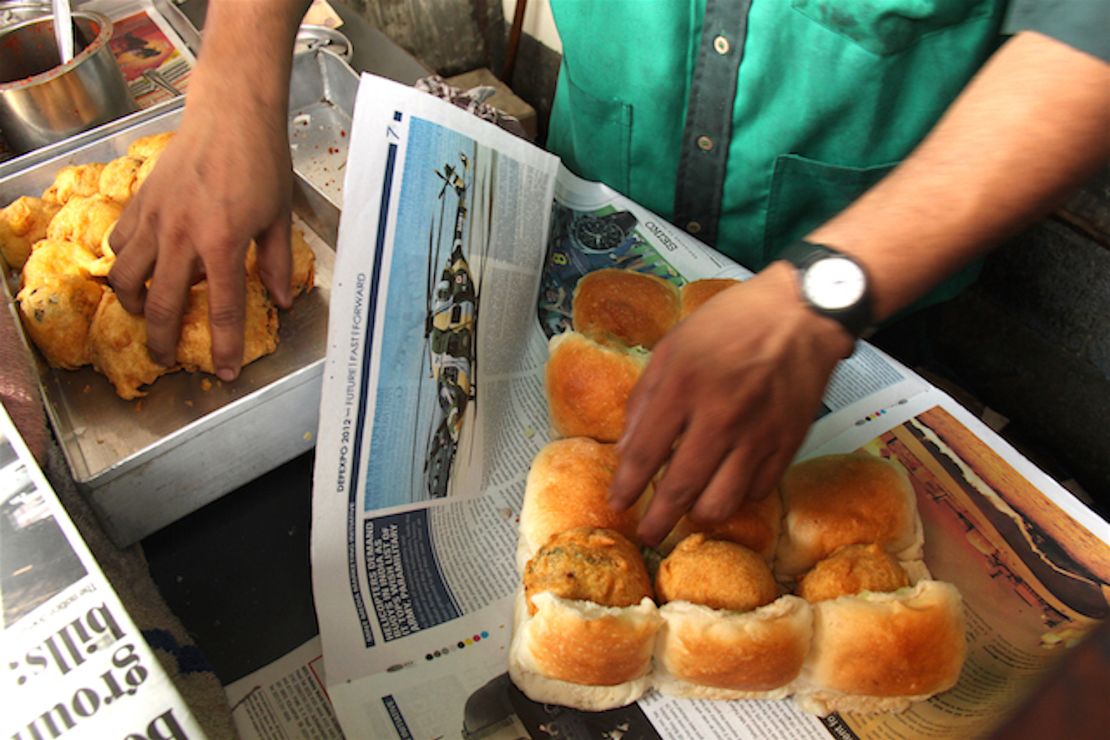
Whether it’s for breakfast, teatime, or anytime, one thing is for sure, Mumbaikars can’t live without the batata vada bite. This well-liked fast food dumpling is made by mashing boiled potatoes with green chilies, ginger, garlic, lime juice, turmeric, and fresh coriander, which is then dipped in a besan (gram flour) batter and deep fried. It’s served either with a green chutney or fried green chillies.
Virtually every street corner will have an outstanding batata vada seller but it’s hard to beat the ones made at Shrikrishna, near Chabildas High School, Dadar Market.
5. Butter chicken
This ubiquitous dish traces its roots to the days of the Mughals when calorie counting was a thing of the future. This must-order dish when Indian families go out for dinner is made from chunks of chicken, marinated overnight in a yogurt and spice mix that includes ginger garlic paste and lime juice. It is then grilled or pan-fried. An ultra-rich sauce made with butter, tomato puree, cumin, garam masala and fresh cream is then poured over. It’s best had with Indian breads like rotis, naan or parathas. Don’t confuse it with chicken tikka masala, which is a story for another day.
While available at every kind of eatery, the butter chicken at Punjab Grill is to die for. Level 3, Palladium Mall, Phoenix Mills, Lower Parel, +91 22 3965 3123.
6. Varan bhaat
If you wanted to name one truly soul satisfying food of Mumbai city, then this would be it. The simple and humble dish is made by lightly tempering cooked-till-soft toor dal (a lentil) with ghee (clarified butter), turmeric and cumin powder. Served over steaming hot rice, or bhaat, it assumes magical, mythical proportions.
A staple in Maharashtrian homes, that’s really where you should be eating it. But do give Diva Maharashtracha a try. Lalita Giridhar Tower, T.H Next To Goa Portuguese Restaurant, Takandas Kataria Marg, Kataria Colony, Shivaji Park, Mumbai, +91 22 3381 4270.
7. The Bombay sandwich
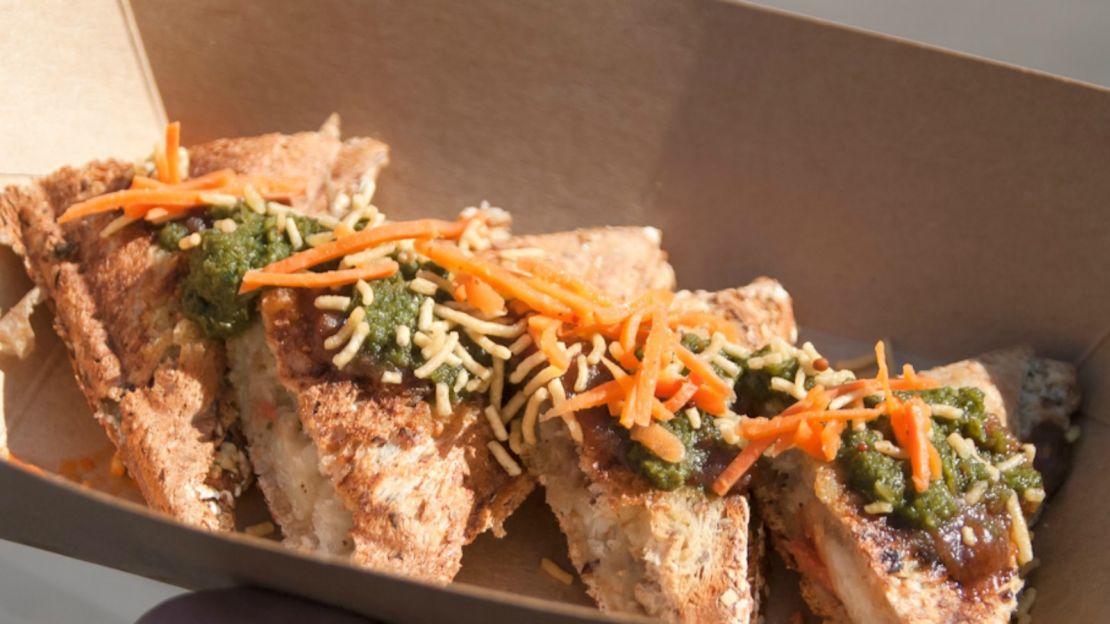
This street-side invention is a combination of the most unlikely ingredients. Lavishly buttered white bread and sandwiched in between thin slices of beetroot, boiled potatoes, cucumbers, tomatoes, onion rings, and mint chutney. Cut into four triangles so that you can handle all the layers without spilling them, you get the most refreshing tangy taste, after each bite. A toasted version steams up the vegetables inside and adds another dimension. Truly, there is no other sandwich quite like it in the world.
Though widely available throughout the city, try it at Amar Juice Centre, near Cooper Hospital, opp. Juhu Galli. Or the Mafco Stall outside Worli Dairy on Worli Sea Face.
8. Bheja fry
Bheja, or goat brain, sauteed with tomatoes, onions, turmeric, green chillies, spices and garnished with fresh coriander, is a staple of all those with hardcore carnivorous leanings in the city. Eaten with a roti (Indian bread) or pao, this melt in the mouth dish has a rich Muslim heritage and you often find that one plate is not enough.
Radio Restaurant, 10, Musafir Khana, Palton Road, +91 22 3315 1900, serves up a really good bheja fry.
9. Zhunka bhakar
This dish has deep roots in the farming and working-class communities of interior Maharashtra. Considered the common man’s food, a political decision was made at the highest echelons of government to make it available everywhere. Overnight, thousands of zhunka bhakar stalls opened, none pricing it at more than 15 cents (Rs 10). Traditionally, the zhunka is made using chopped onions tempered with mustard seeds and kadipatta leaves mixed with chickpea flour and is dry. It is eaten with jowar (millet) bhakri or roti.
Try the stalls opposite Chhatrapati Shivaji Terminus (originally called Victoria Terminus) and BMC Headquarters.
10. Bombil fry
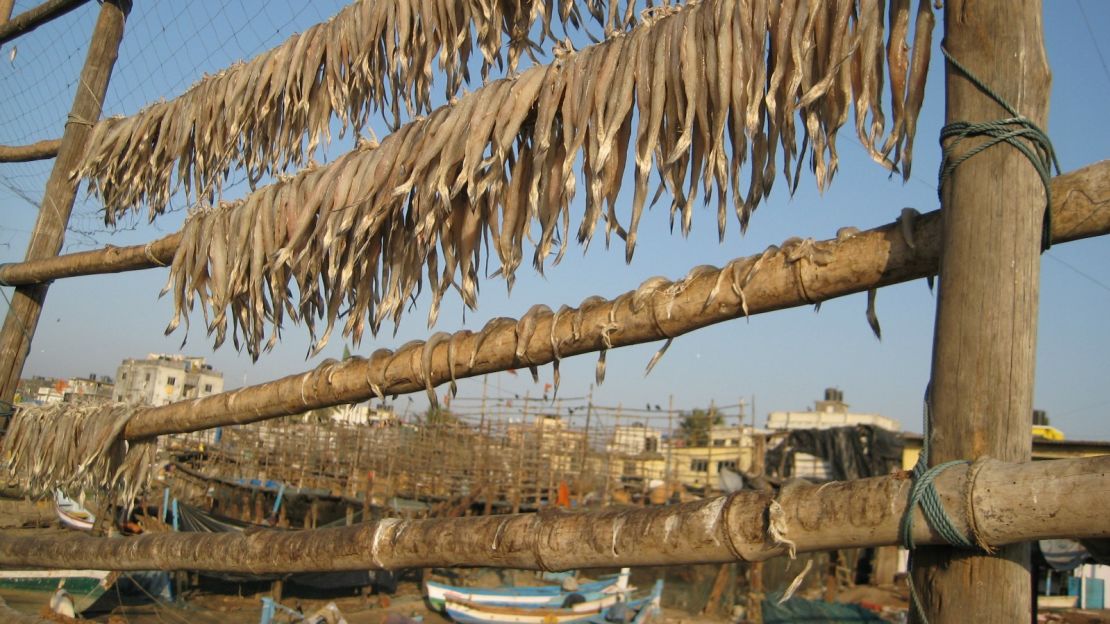
Bombil, or Bombay Duck, is a fish (and not a duck) found in plentiful supply in the waters around Mumbai. A fisherman’s favourite, Bombils are flattened, then dipped in a spice-filled besan (gram flour) batter and fried. This crunchy-on-the-outside and mushy-soft-on-the-inside fish dish can be eaten on its own as a starter, or as a main course with chapattis.
Gajalee restaurant does a mean bombil fry. They have branches at Hanuman Road, Vile Parle (E), +91 22 26114093. And at Phoenix Mills, Lower Parel, +91 22 2495 0667.
11. Brun maska
You may wonder how bread and butter can become such an iconic union. But it’s not merely bread and this is not merely butter. It’s brun or gutli pao – a local bread that is unique to Mumbai – and it’s crisp and hard and crumbly on the outside and soft inside. The brun is sliced and butter is applied lavishly. Some even sprinkle on quite a bit of sugar. It is usually accompanied by sweet Irani chai. Dipping brun maska in chai is the only way to eat it.
Available at most Irani restaurants, the brun maska at Kyani & Co is historic. Ratan Heights, Dr D B Road, Opposite Navjivan Society, Mumbai, +91 98207 64444. Also try it at B Merwan, Opp. Grant Road Station (E), +91 (0) 22 2309 3321.
12. South Indian ‘meals’
“Meals Ready” is a common sign found outside South Indian restaurants. In front of Udipi hotels, a euphemism for all south Indian cuisine, it means vegetarian meals laid out on a thaali, a stainless steel plate, or on a traditional banana leaf. A couple of vegetables, sambar (spicy and sour lentils and vegetables boiled with masalas and spices), rasam (a hot and fiery lentil soup-like dish) and curds (yoghurt) served with heaps of rice and eaten in that order. A non-vegetarian version of the “meals” can be found in “Military” hotels.
Try the “meals” at this 68-year-old haven: Rama Nayak’s Udipi Shree Krishna Boarding, bang outside the Matunga (E) station, +91 (0) 22 2414 2422.
13. Bhel puri
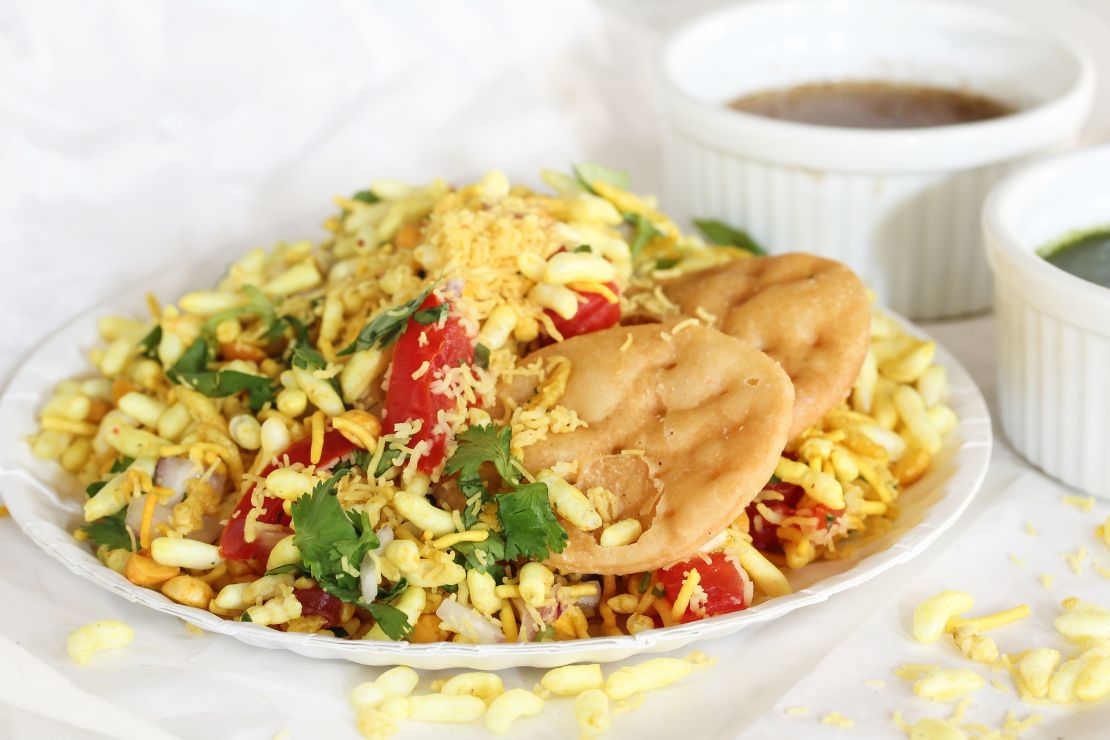
The most commonly sold “chaat” (snack) on the streets of Mumbai, every bhel walla will have his own matchless blend and a considerable 7pm fan following. While the ingredients – puffed rice, papadi (small crisp deep fried flour puris), sev, onions, potatoes, raw mango and sweet and sour chutney – remain the same, it is the proportions in which they are thrown together on the street side that makes the difference.
Bhel puri is available everywhere. The stalls at Chowpatty and Juhu beaches draw throngs of die-hard fans. But if you want a bhel puri with ambience, try it at Sea Lounge, Taj Mahal Hotel, Apollo Bunder, +91 (0) 22 6665 3366.
14. Chicken mayo roll
Almost every school or college canteen serves it. Most single screen cinema houses showing English movies display it during the interval. Most bakeries will have their version, neatly wrapped in cellophane, at the counter. Some grocery stores in upmarket areas stock it along with grain and rice. It’s hard to believe that plain boiled chicken doused in sweet-ish mayonnaise with a celery leaf for dressing, all wrapped up in a bread roll can be so popular in a spice loving city. But it is.
One of the creamiest chicken mayo rolls can be had at Paradise, Sindh Chambers, Shahid Bhagat Singh Road, Colaba, +91 22 22832874. Or try it at Candies, Mac Ronells, 5A Pali Hill, St. Andrews Road, Bandra (W), +91 22 26424124.
15. Ragda pattice
This twin delight is a combination of ragda, soft, spicy, rugged-flavored chickpeas, and pattice, mashed potatoe shaped into fat patties and fried. The ideal way is to eat it is to crush the ragda with the pattice and pile on the accompaniments – finely chopped onions, tangy tamarind sauce and fiery green chutney. Mash it all up and dig in for the true flavor of Mumbai.
A favorite street food, it is part of the chaat family and is commonly found all over. A good place to try it is Kailash Parbat, Sheela Mahal, 1st Pasta Lane, Colaba, +91 22 2287 4823
16. Chicken manchurian
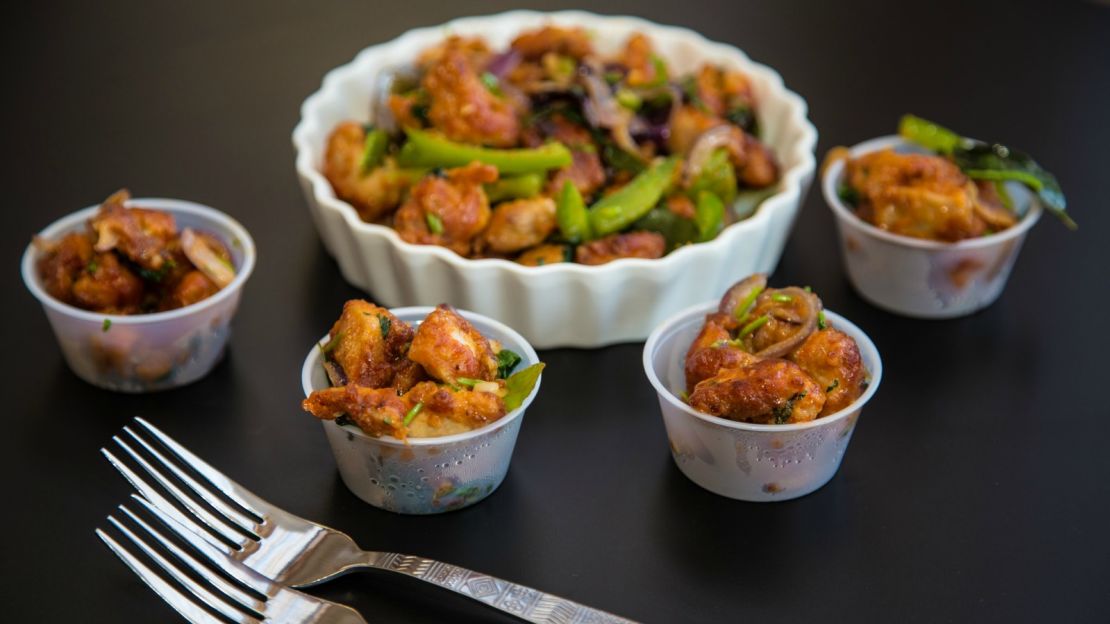
Here’s a dish that even the Chinese over on the mainland haven’t heard about. Snigger, snigger. Yet it’s on the menu of the roadside handcart Chinese food hawker and the Chinese restaurant in the fancy five-star hotel. Chicken manchurian, a phrase that has come to be the face of Chinese food in India, is nothing but deep-fried batter-coated chicken cubes in an onion, green chillies, garlic, vinegar and soy sauce gravy. Eaten with rice, it never fails to get a sigh of contentment from those partaking of this gastronomic oddity.
If you want to taste the real thing, try it where it was created, China Garden, Om Chambers, Kemps Corner, +91 (0) 22 2363 0841
17. Sabudana vada
For Maharashtrians, sabudana vada is the traditional “upvas” or fasting food and the really hardcore folk fast up to four times a week. The good news is that restaurants never fail to oblige with hot, crisp sabudana vadas for those who don’t have the time to make it at home. Sago is soaked until it puffs up. Crushed boiled potatoes, green chillies, coriander leaves and salt are kneaded in. They are then fashioned into palm-sized patties and deep fried until they turn crisp and golden. And then one bite leads to another and another.
Sabudana vadas are available at most Udipi hotels and roadside stalls. But try the ones at the R K Studio Canteen, Chembur. They are really special.
18. Butter garlic crab
It doesn’t trace its roots to Chinese, Continental or Indian cuisines. It comes from Butter Land, an imagined place that thrives on the premise that anything tastes great with melted butter. A delicious, simple dish, a big crab is drowned in tons of butter garlic sauce that seeps into every nook and cranny and coats every morsel of the flesh. Crack open the crab and take a bite. You’ll know immediately that sweet crabmeat and butter with a twist of garlic is a combination made by gods.
The best butter garlic crab can be found at Mumbai’s most famous seafood restaurant. Trishna, Sai Baba Marg, Near Rhythm House, Kala Ghoda, Fort, +91 80590 02601.
19. Falooda
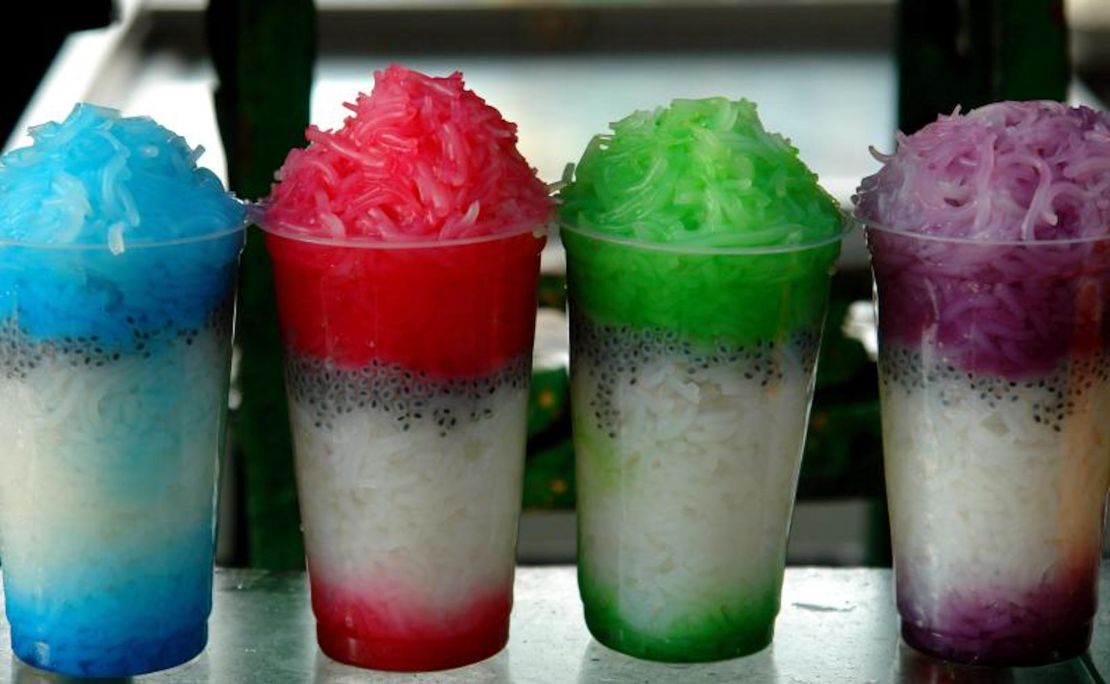
This adaptation of a Persian dessert was brought to India by the Mughals. A rich drink, Falooda is vermicelli mixed with milk, almonds, pistachios, a bit of rose syrup and the key ingredient – sabza or basil seeds – topped up with two scoops of ice cream. Refreshing, rosy, energizing, it’s a great pick-me-up on a hot day.
Badshah, at 152/156 LT Marg, Opp. Crawford Market. Tel: +91 (0) 22 2342 1943, has a reputation for their falooda.
20. Fish and prawn curry
These two dishes are as old as Mumbai herself (remember, this city started off as a fishing village under various kings and sultanates until the Portuguese and English discovered it in 1534). This coconut-based light curry can be prepared using a variety of fish or prawn. But the most popular curries use surmai (kingfish), pomfret (butter fish), bangda (mackerel) or bombil (Bombay duck). And the only way to truly enjoy it is with parboiled country rice.
For Konkani and Malvani style fish curry go to Sadichha, B-5 Gandhi Nagar, Opp. MIG Club, Bandra (E), +91 22 2642 5630. For Karwar style fish curry there’s Fresh Catch,144/C, Diamond Court Chawl, PN Kotnis Road, Mahim West, Mahim, Mumbai, +91 (0) 22 2444 8942.
21. Puran poli
A festive dish made by Maharashtrians and Gujaratis especially during Holi (to celebrate the end of the winter season) and Dussehra (to celebrate the triumph of Lord Ram over the demon Raavan). It is made by simmering chana dal (yellow gram) with sugar or jaggery (molasses or gur) till it dries up, and then hand-grinding to smooth it out. Nutmeg and cardamom powders are the flavorings. Palm-sized balls of the paste are stuffed into wheat flour dough and rolled out to be roasted on a tawa frying pan with a little ghee (clarified butter). Do add a lot of ghee when you’re eating them, they taste tops then.
Puran polis can be found in some grocery stores but they are a poor mass-produced version of the real thing. The real ones can only be found in a Maharashtrian or Gujarati home.
22. Dhoklas and farsaan
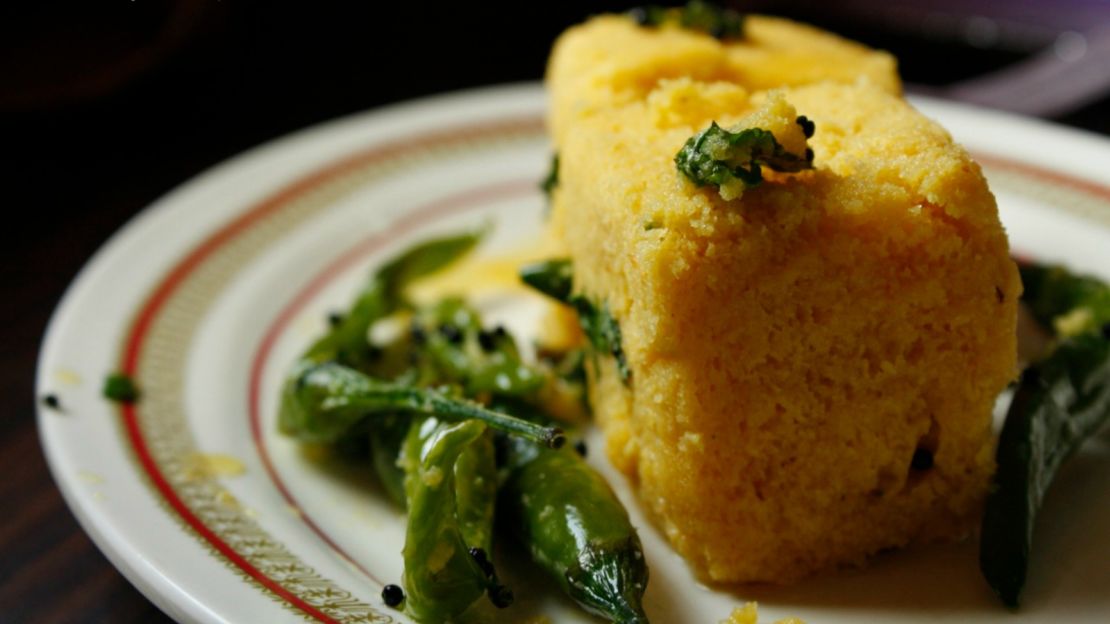
These popular snacks are so integral to food loving Gujaratis that no meal is complete without them. And when traveling abroad, they don’t leave home without a little parcel tucked away in their luggage. Dhoklas or “khummun” are made from the fermented batter of chickpeas, steamed and then spiced with chillies and ginger and tempered with mustard seed. Farsan, a broad term for savories encompassing sev and gathiya are crisp deep-fried spiced gram flour creations in pasta like shapes.
Several stores stock these popular snacks. But try them here: Chedda Dry Fruits & Snacks, 41 Ridge Road, Walkeshwar, +91 22 (0) 2369 9442. Dave Farsan Mart, 10 Babulnath Road, near Chowpatty, +91 (0) 22 6657 8311. Go-Go Snacks, Bhavan’s College Lane, Chowpatty, +91 22 (0) 2361 9968.
23. Frankie
Inspired by the Lebanese pita bread wrap and suitably Indianized, the Frankie, or should I say the Tibbs Frankie, has satiated hordes of the hungry in search of a quick lip-smacking snack. Basically, it’s a juicy naan bread with an egg coating, stuffed with mutton or chicken, rolled up and sprinkled with a unique masala that gives it its special flavor. The vegetarian option does not use eggs and the stuffings include paneer or potatoes.
Available all over the city. For a Tibbs Frankie closest to you, call +91 (0) 22 2821 4698.
24. Nalli nihari
The phrase “breakfast like a king” gets taken to another level when you dig into a plate of Muslim nalli nihari. You could probably do anything after this power meal made of soft and tender mutton shanks in a rich, greasy gravy filled with marrow and steeped in spices, the flavors exploding with delight. A crisp roti makes for the perfect accompaniment. Can you stomach this for breakfast?
The best nalli nihari can be had at Noor Mohammadi, 179 Wazir Building, Abdul Hakim Noor Mohammadi Chowk, Bhendi Bazaar, +91 22 2345 6008. Just make sure you get there before noon or you may leave disappointed.
25. Gujarati thaalis
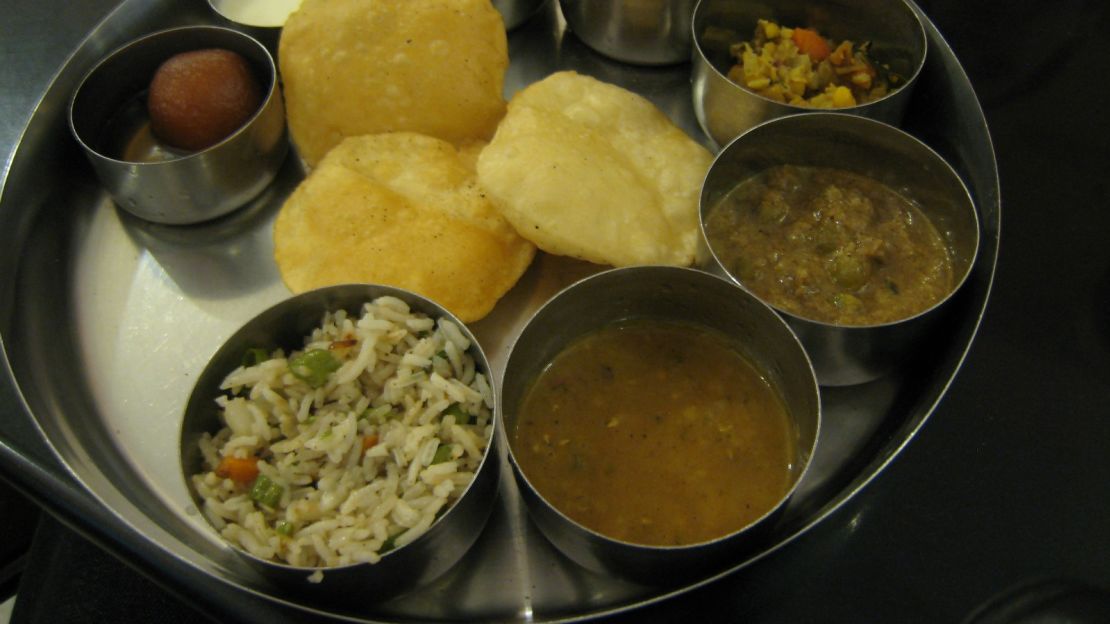
In fast-food terms think of this as a large, all-you-can-eat combo platter served on your table in unlimited quantities. Three types of farsan (fried snacky things with a plethora of chutneys). Two kinds of vegetables. Two kinds of lentils. Dal and kadhi (hot and spicy yoghurt-based dish). A basket of different rotis and puris (deep-fried breads). Two kinds of rice. Two desserts. And mango pulp which the purists pour all over the plate. All this for a modest price. Gasp! A note on Gujarati cuisine: most dishes tend to be on the sweet side and that makes an interesting combination with the spiciness of the food. Mumbaikers either love it or ignore it.
Try Golden Star Thali, 330 Raja Rammohan Roy Road, Opp. Charni Road Station, Girgaum, +91 22 2367 1952 Or, Chetana, 34 K Dubash Marg, Kala Ghoda, Fort, +91 22 2282 4983.
26. Kheema pao
Minced mutton cooked with onions, garlic, tomatoes, chillies and spices takes on many avatars here. In its original form, it is referred to as plain kheema. Topped with a crisply fried, sunny-side-up egg, it is called kheema single fry. And scrambled with eggs, it is called ghotala. And all three are best eaten with Mumbai’s signature pao bread bun. Traditionally a breakfast dish, it is now eaten at all times of the day or night.
Try it at Stadium Restaurant, IMC Building, Veer Nariman Road, Churchgate, +91 (0) 22 2204 6819. Or at Olympia, Rahim Mansion, 1 Shahid Bhagat Singh Road, Colaba, +91 (0) 22 2202 1043.
27. Patra ni machhi
Another top-of-the-line Parsi dish. This is freshly caught pomfret, marinated in a chutney that includes grated coconut, green chillies, fresh coriander and mint leaves, cumin, sugar, lime and salt. It is then wrapped in banana leaf and steamed for about ten minutes. Gently unwrap and consume quietly, close your eyes and savor the flavor of a culinary culture that will fill your senses.
A very good patra ni machhi can be had at Ideal Corner, 12/F/G, Hornby View, Gunbow Street, Fort, +91 (0) 22 2262 1930. Only available on Saturdays.
28. Kebabs
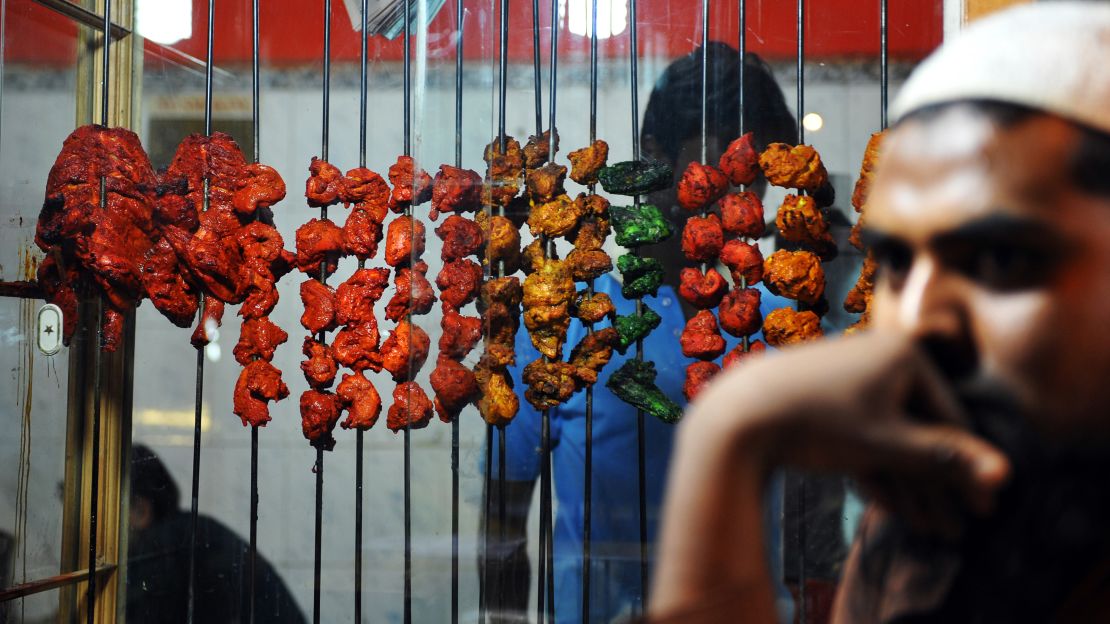
While the kebab per se may not be unique to Mumbai or the region, a few varieties that emerged from the Bohri Muslim community are truly unique. Gurda (kidney) and kaleji (liver) top this list. Charcoal grilled, they go great with freshly sliced onions and a squeeze of lime.
Try it at Ayubs, on the street behind Rhythm House, Kala Ghoda, open only in the evenings. The best beef kebabs are to be found at Sarvi, 184/196 Dimtimkar Road, opposite Nagpada Police Station, Byculla (W), +91 9833 533 305. And for some outstanding north-west frontier style kebabs, go to Peshawari, ITC Grand Maratha, Sahar Road, Andheri (E), +91 (0) 22 2830 3030.
29. Kolhapuri mutton
The hotter the temperature of a city, the hotter the food. And it’s true of this mutton dish that has its roots in Kolhapur, a city in the south of Maharashtra. It comes in two coconut based gravy variations. The nuclear strength version is called tambda rassa (a red chili-spiced extravaganza). And the milder version is called pandhara rassa (yoghurt, cashew nuts and raisin embellished). Both go well with either rotis or rice when you’re in the mood for a feast.
Taste the heat at Purepur Kolhapur, 1, Aditya Apartments, Parleshwar Road, Parleshwar Mandir, Vile Parle (E), +91 22 2613 6181
30. Modak
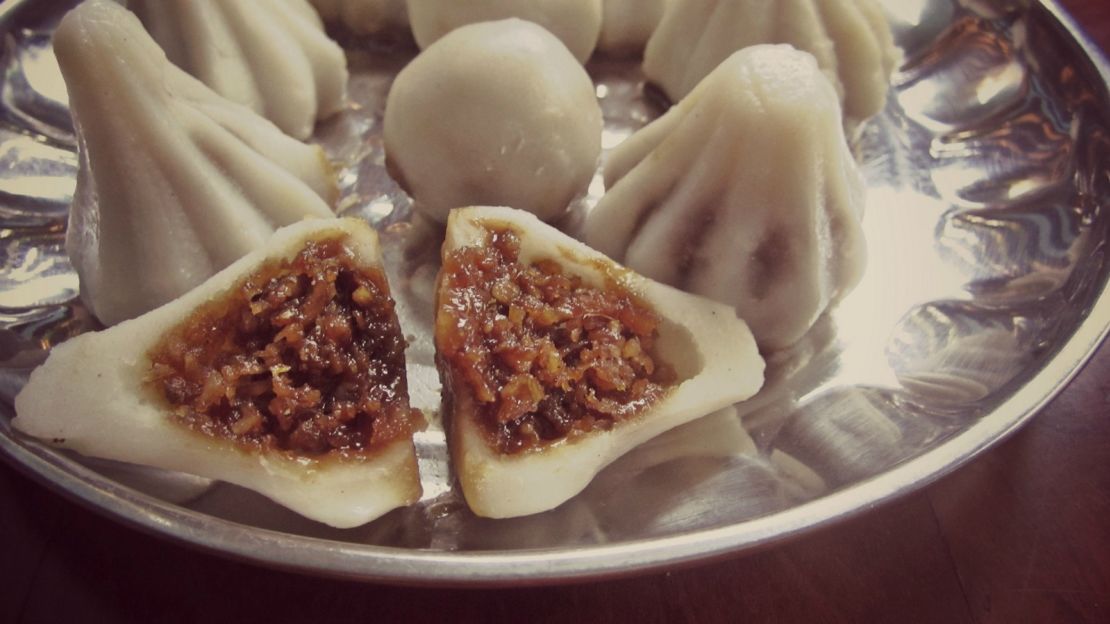
A Maharashtrian sweet prepared during the Ganesh festival around August, modak is offered to Lord Ganesha, the elephant-headed god, because it is his favorite sweet. Wheat flour dough kneaded with milk, stuffed with grated coconut and mixed with sugar or jaggery. Shaped like a teardrop and steamed or fried. Typically 21 are made as an auspicious offering to the god and tons more for the rest of the family. It’s a pity that it’s made only once a year.
Some sweet shops do keep modak during the festival season but it is made of khoya (thickened milk) and is not the real thing. For that, you’ll have to drop into a home that is celebrating the festival.
31. Kanda poha
A must-have in Maharashtrian families, you will rarely find a badly made kanda poha dish. This simple, easy-to-make snack is made with kanda (onions) and poha (flaked rice) mixed with chopped potatoes and green chillies, sometimes even peas. Tempered with mustard seeds and garnished with fresh coriander and a squeeze of lime, it lights up dull days and cements the many days in a marriage together.
Try it at Aswad, L J Road, Opp. Shiv Sena Bhavan, Dadar (W), +91 (0) 22 2445 1871.
32. Vada pao
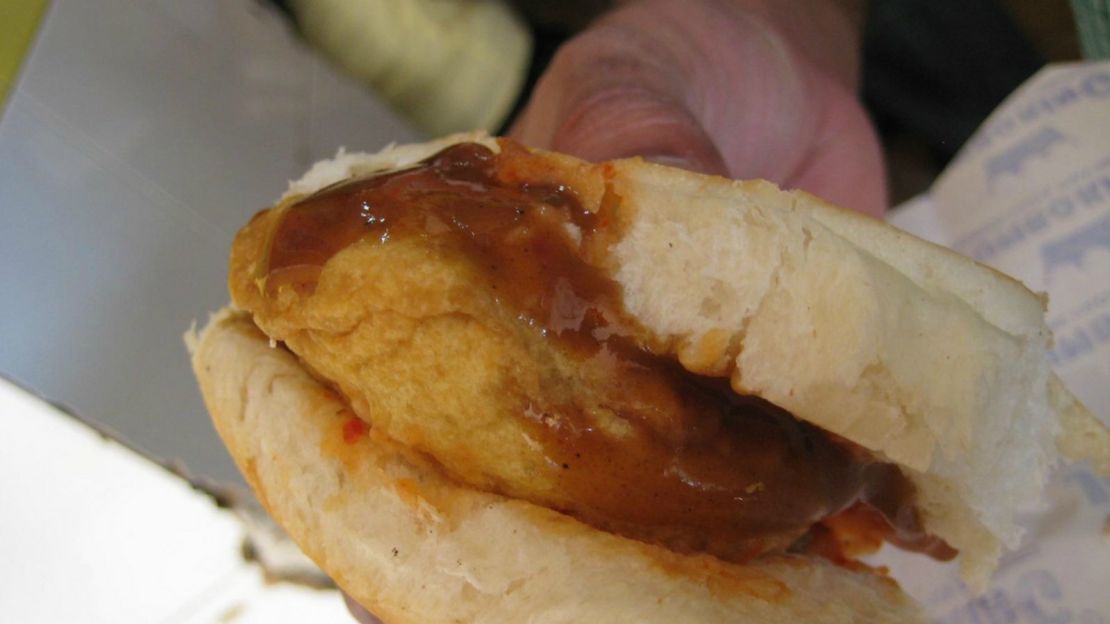
In the vast fast food world of Mumbai, this is the tastiest “cutlet in a bun” by a mile. And no, it’s not available at McDonald’s. Every Mumbaiker’s favorite on-the-go snack, the vada pao satiates millions every day. The recipe, hard to duplicate because each stall owner has his own secret ingredient, uses a combination of boiled potatoes mashed with fresh coriander, green chillies, a bit of ginger and sometimes garlic, made into palm-sized balls, dipped in a chickpea-flour batter and deep fried till golden. They are stuffed into a pao smeared with a layer of spicy green chutney and a fiery red garlic crush. Tastes best when eaten hot.
It’s a crime to eat vada pao anywhere else but on the street. Try Ashok Satam’s Stall, on the Flora Fountain side of the Central Telegraph Office (CTO), Fort.
33. Misal pao
Quintessentially from Pune, this rustic dish is made from a mix of curried sprouted lentils, topped with batata (potato) bhaji, poha (rice flakes), chivda, farsan, raw chopped onions and tomato. This hot and spicy dish is eaten with pao bread. To cut the fire, add some yogurt.
A good version can be found at Vinay Health Home, 71/83, Jawahar Mansion, Fanaswadi-Thakurdwar Corner, Girgaum, +91 (0) 22 2208 1211.
34. Pao bhaji
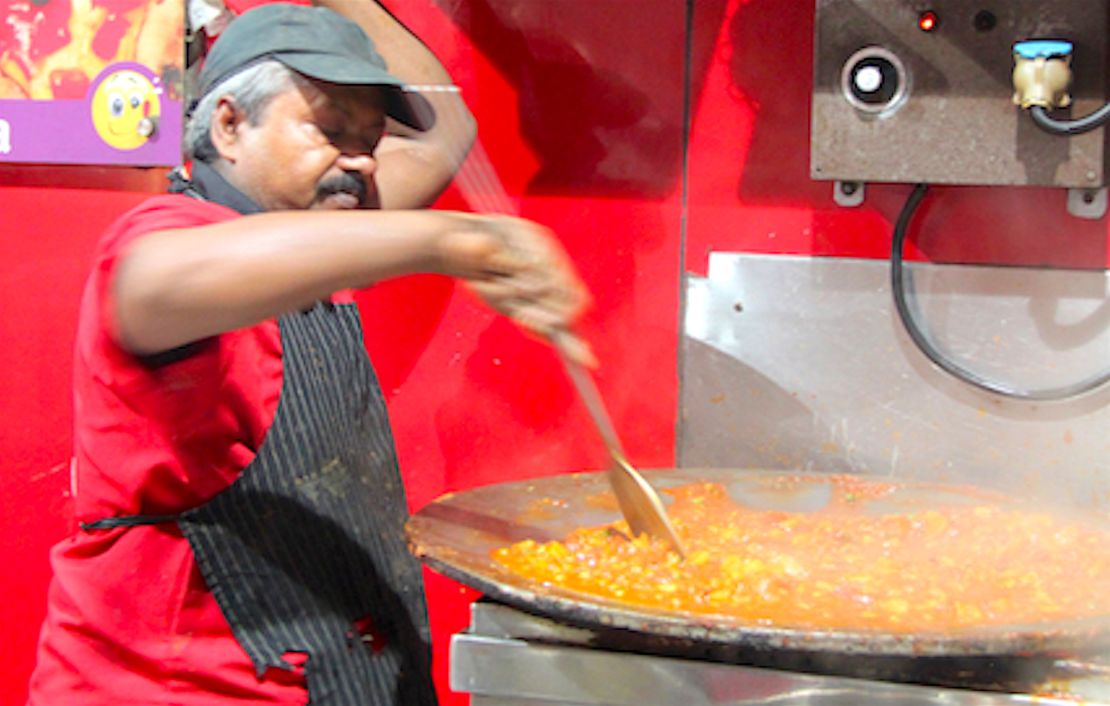
This specialty dish from the bylanes of Mumbai is made of mashed steamed mixed vegetables (mainly potatoes, peas, tomatoes, onions and green pepper) cooked in spices and loads of butter. It is eaten with pao, which is shallow fried in even more butter and served with chopped onions. Sometimes cheese and paneer (cottage cheese) are added. People from all over India come to Mumbai to eat pao bhaji.
Though widely available at local restaurants, try the sinful pao bhaji at Sardar, 166A Tardeo Road Junction, Opp. Bus Depot, Tardeo, +91 (0) 22 2353 0208.
35. Mutton dhansak
Representative of Parsi cuisine, mutton dhansak falls in the category of soul food. It is mutton cooked till tender in a lentil dal laden with spices. It is eaten with browned rice topped with deep fried onions, garnished with mutton kebabs and sprinkled with a crunchy mix of chopped raw onions, raw tomatoes and coriander. The after-effects are usually exhibited in a sound afternoon nap.
This rich dish, outside of a home, is best had at Ripon Club, 123A MG Road, Opp. Bombay University, Fountain, +91 22 2270 1456. Find a member to take you there. Failing which, go to Britannia, Wakefield House, 11 Sprott Road, Ballard Estate, +91 (0) 22 2261 5264.
36. Prawns koliwada
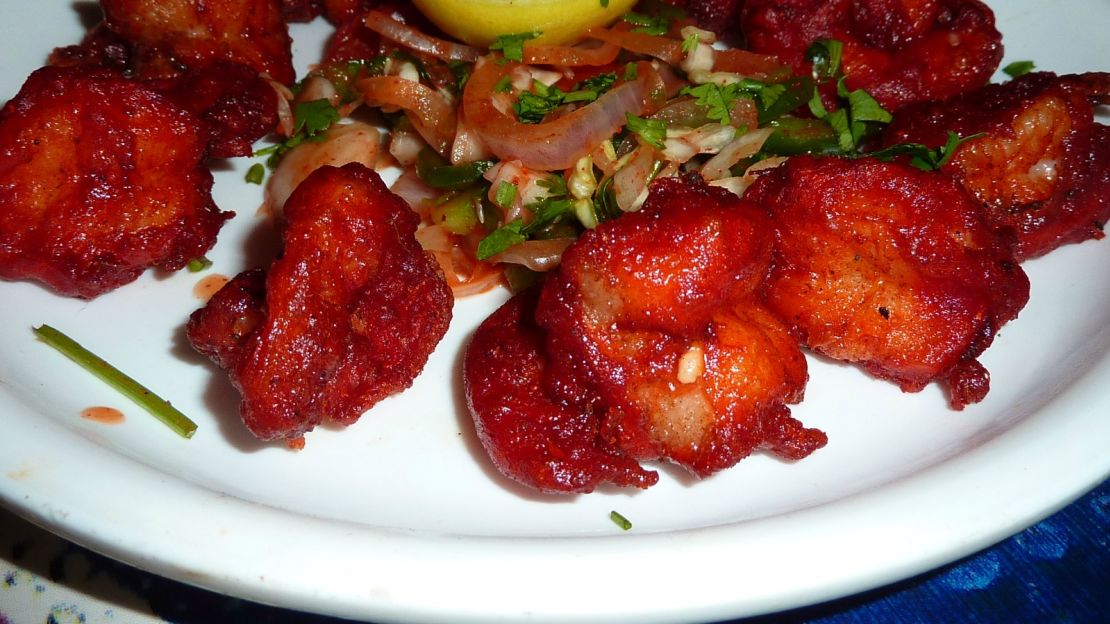
Contrary to popular belief that this dish originated on the Konkan coast – which runs south from Maharashtra and encompasses Goa and Karnataka – it is actually a very Mumbai dish. The story goes that it was created in the Sion “koliwada” or fishing village by – and here’s the twist – a north-Indian immigrant from Punjab. These deep-fried prawns marinated in a batter of flour, spices and ginger-garlic paste can be identified by their signature red color. And they are crunchy yet melt in the mouth. Pick the smaller sized prawns, they taste better.
Try the real thing at Hazara, GTB Nagar, Near the Gurudwara, Sion (W), +91 (0) 22 2409 2617.
37. Mutton sukke
Mumbaikers break out into sweat over this Malvani-style mutton dish. Chunks of mutton on the bone marinated in a hot Malvani masala and fried with onions and garlic and red chillies until everything browns and the meat is tender. It can be eaten with chapattis or wade, rice flour pancakes.
Try it at Jai Hind Lunch Home, 6 Mantri Corner, Gokhale Road South, Dadar. Tel: +91 22 2430 4799
38. Samosa
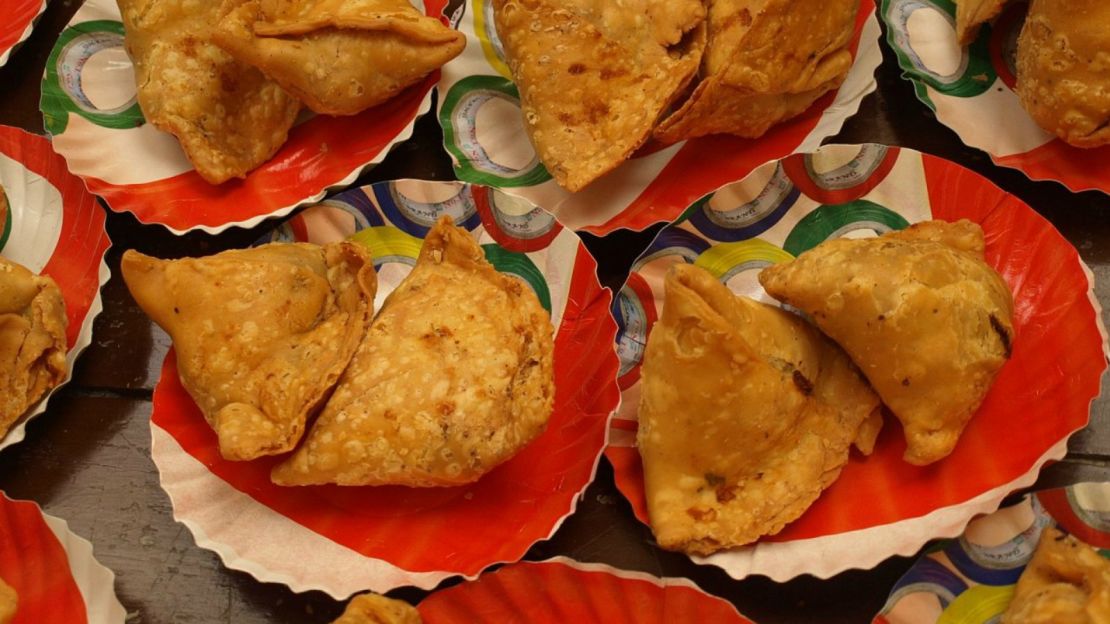
It’s best to bite into a hot one, hiding under a street stall during a typical Mumbai monsoon downpour. When you go through the crisp crust, you meet the steaming and savory-with-a-hint-of-sour chunks of spiced potatoes and peas. Lovingly shaped into triangles and deep fried, these calorie busters are worth the one week that you’ll need on the treadmill to work them off. A samosa can also give you heart at that last leg of your day when transport is not in sight, it’s dark and there’s a long way home.
You can ask for Guru Kripa samosas at many stores across Mumbai. Or go to the original Guru Kripa Hotel, 40, Guru Kripa Building, near SIES College, Sion, +91 (0) 22 2407 1237.
39. Sizzlers
As kids, a sizzler was part of the “growing up in Mumbai” experience. The sight of a sizzler arriving at your table, like an old steam engine, sizzling and spluttering to a halt in front of you, was an exciting experience. It is a combination of grilled meats and vegetables served on what looks like a hot chunk of black iron, with a side of mashed potatoes or fries and gravy. Sizzlers come in several vegetarian options too. Long lines at restaurants are a testimony to its enduring popularity.
Give sizzlers a try at places synonymous with the word: Kobe, 13/14 Sukh Sagar, Hughes Road, Opera House, +91 (0) 22 23632174. Or Yoko, West View, S V Road, near Akbarally’s, Santacruz (W), +91 (0) 22 2649 2313.
40. Sorpatel and vindaloo
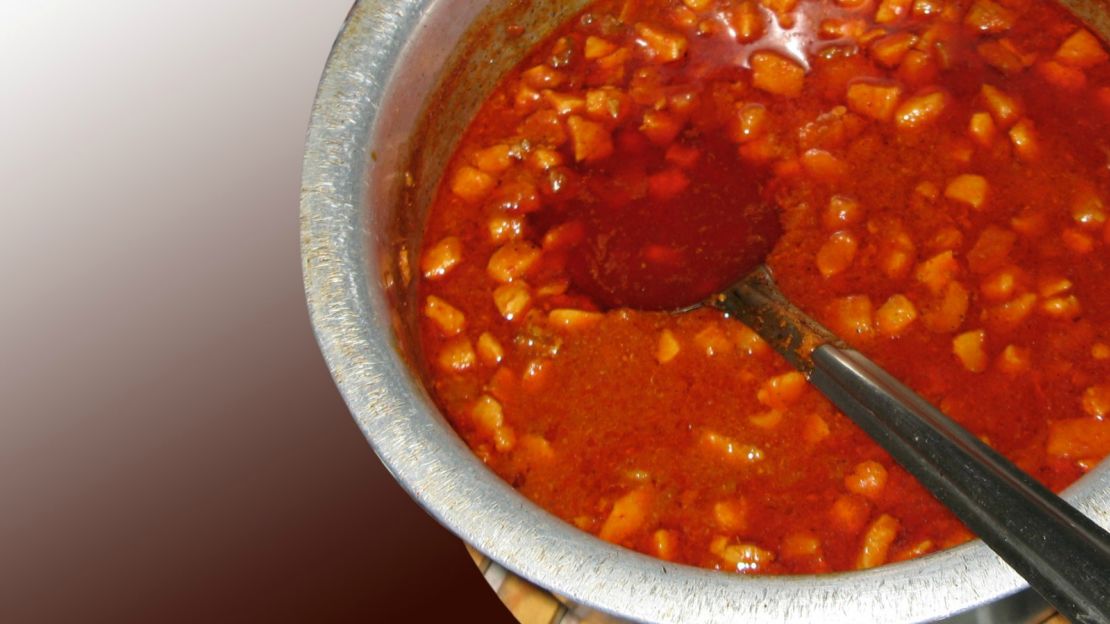
These Goan specialties set your taste buds on fire and grandmothers are rumored to pass out feni shots (a strong Goan brew made from palm or cashew nuts) to douse the flames. The sorpatel has all parts of the pig, including its blood, in the recipe. And the vindaloo is made with chunks of fatty pork meat cooked with spices, red chillies and lots of vinegar. Ideally, they are eaten the next day, after having spent the night soaking in all the juices and flavors.
Try sorpatel, vindaloo and other Goan delicacies at City Kitchen, 01 Palli Market, Bandra West, Maharashtra, +91 98190 00460. Or, New Martin Hotel, 11 Glamour House, Strand Cinema Road, Colaba, +91 (0) 22 2202 9606.
Sanjiv Khamgaonkar is a writer, filmmaker, foodie, and digital artist.
Editor’s note: This article was previously published in 2010. It was reformatted, updated and republished in 2017.
